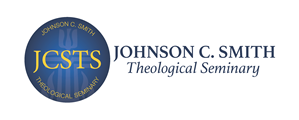Summary of JCSTS' Past and Present
 JOHNSON C. SMITH THEOLOGICAL SEMINARY (JCSTS) is the only historically Black theological seminary of the Presbyterian Church (USA). It dates back to 1867 and the founding of Freedman's College of North Carolina-a school created specifically to educate newly freed slaves. The Charlotte-based institution subsequently was named Biddle Memorial Institute, graduating its first class of three in 1872. In 1923, Mrs. Jane Berry Smith of Pittsburgh, PA, generously endowed the institution and constructed several buildings on the 75-acre campus in honor of her late husband, Johnson C. Smith, for whom the institution was then named.
JOHNSON C. SMITH THEOLOGICAL SEMINARY (JCSTS) is the only historically Black theological seminary of the Presbyterian Church (USA). It dates back to 1867 and the founding of Freedman's College of North Carolina-a school created specifically to educate newly freed slaves. The Charlotte-based institution subsequently was named Biddle Memorial Institute, graduating its first class of three in 1872. In 1923, Mrs. Jane Berry Smith of Pittsburgh, PA, generously endowed the institution and constructed several buildings on the 75-acre campus in honor of her late husband, Johnson C. Smith, for whom the institution was then named.
In 1969, facing declining enrollment, the seminary withdrew from the university and relocated to Atlanta, GA, where it joined the federation of historic African-American Protestant seminaries known as the Interdenominational Theological Center (ITC). Following the move, JCSTS grew steadily reaching a peak enrollment of nearly 60 students and producing a cadre of notable leaders who serve the Church nationally and internationally.
In 2014, amid dramatic shifts in the leadership needs of the Church, JCSTS disaffiliated from the ITC with an eye toward delivering educational programs that are more affordable, accessible for a broad audience, and relevant in a changing world. An institution born of the Black Church, JCSTS remains committed to advancing the healing and liberating gospel of Jesus Christ among people from all walks of life.
For a more detailed account the of the seminary's history, go to the About tab and click on the History tab from the drop down menu.
Financial Snapshot
Johnson C. Smith Theological Seminary has a 4 million dollar endowment managed by the Presbyterian Foundation, and a $700,000 annual budget.
Current Status
JCSTS offers customizable, competency-based theological education specializing in (1) African-American worship, preaching, and sacred arts; (2) clergy wellness and sustainability; and (3) social justice and activism. For more information, click the 'Programs' tab.



.jpg) When JCSTS announced in April 2014 that the institution was disaffiliating from the Interdenominational Theological Center after a 45-year membership, many within the seminary community expressed fear that JCSTS would be unable to sustain itself as a freestanding institution. Despite our reassurances and rationale about emerging changes in higher education and the incumbent need of JCSTS to reposition itself to attract students, it quickly became apparent that words were not enough. For many, JCSTS simply was going to have to demonstrate its viability and stability over time.
When JCSTS announced in April 2014 that the institution was disaffiliating from the Interdenominational Theological Center after a 45-year membership, many within the seminary community expressed fear that JCSTS would be unable to sustain itself as a freestanding institution. Despite our reassurances and rationale about emerging changes in higher education and the incumbent need of JCSTS to reposition itself to attract students, it quickly became apparent that words were not enough. For many, JCSTS simply was going to have to demonstrate its viability and stability over time.



 ncy-based theological education specializing in (1) African-American worship, preaching, and sacred arts; (2) community organizing; (3) racial reconciliation; and (4) clergy care.
ncy-based theological education specializing in (1) African-American worship, preaching, and sacred arts; (2) community organizing; (3) racial reconciliation; and (4) clergy care.










 Ivan Allen IV, Director, Business Development, Staples, Atlanta, GA
Ivan Allen IV, Director, Business Development, Staples, Atlanta, GA .
. 